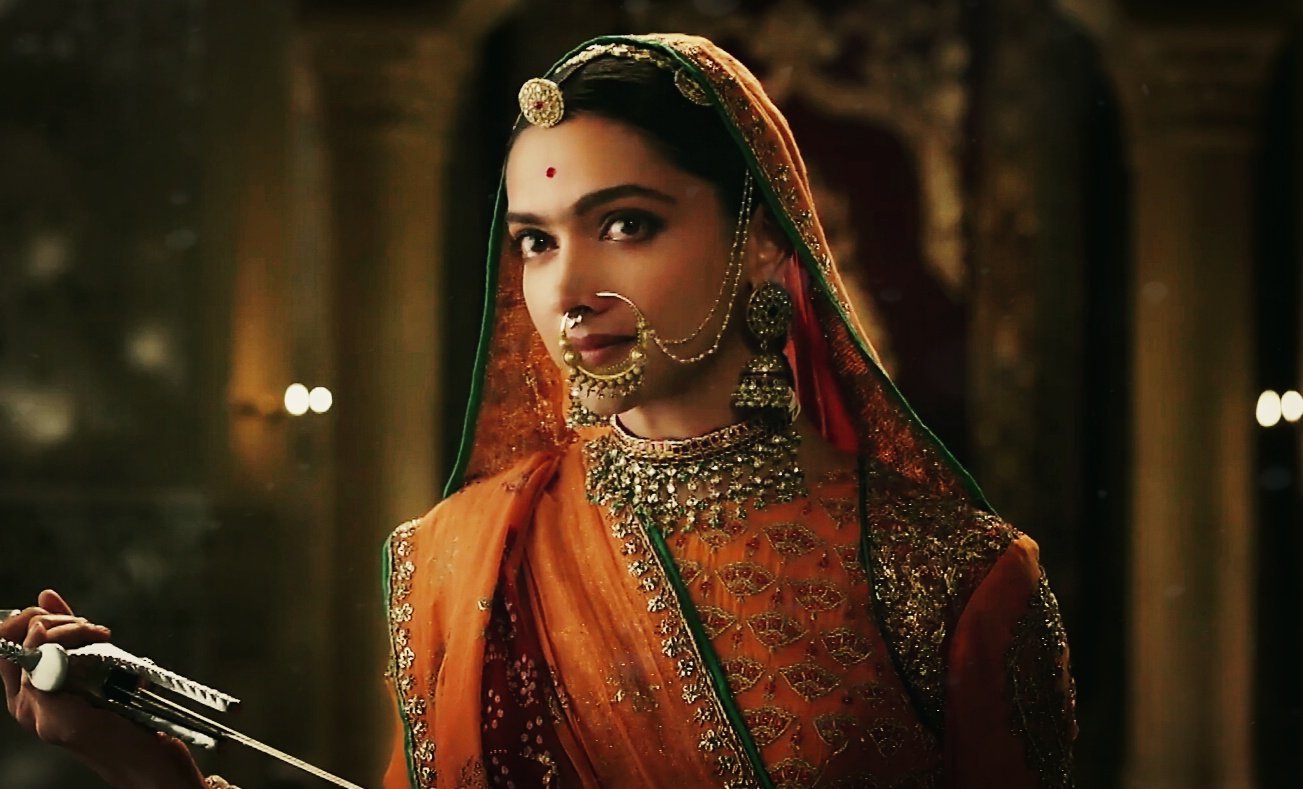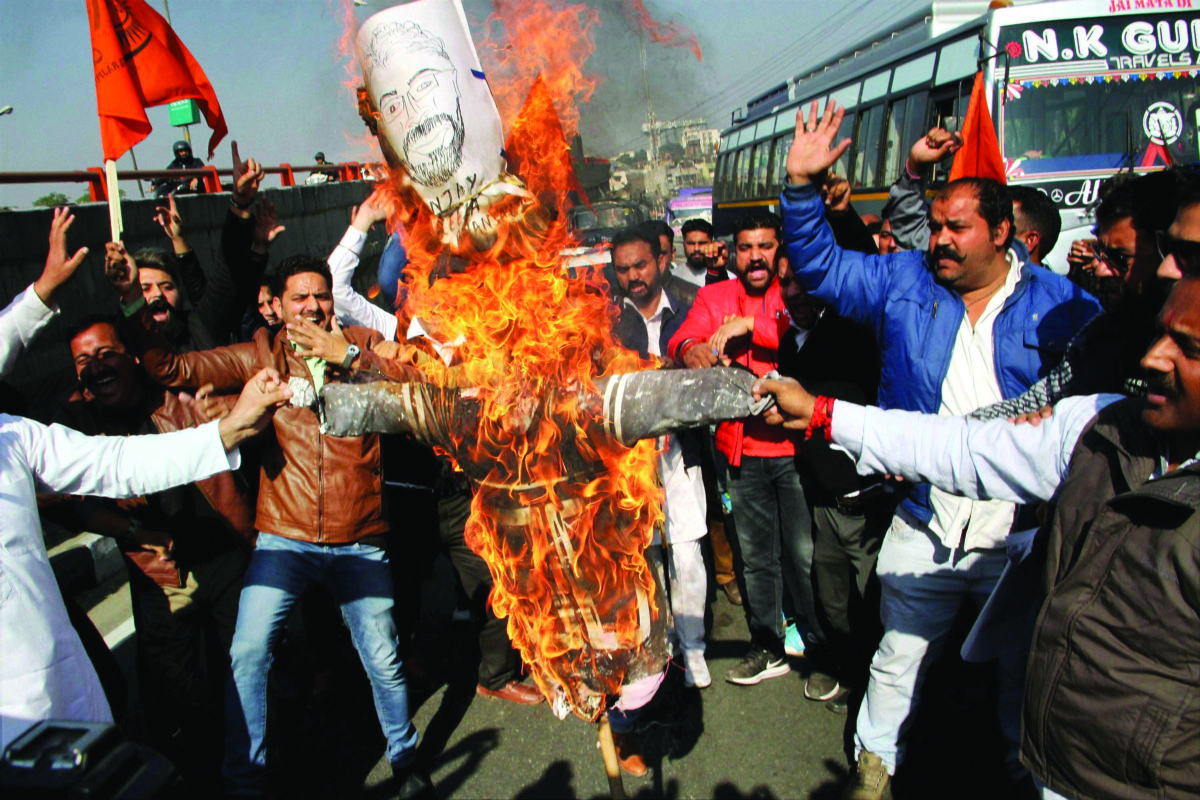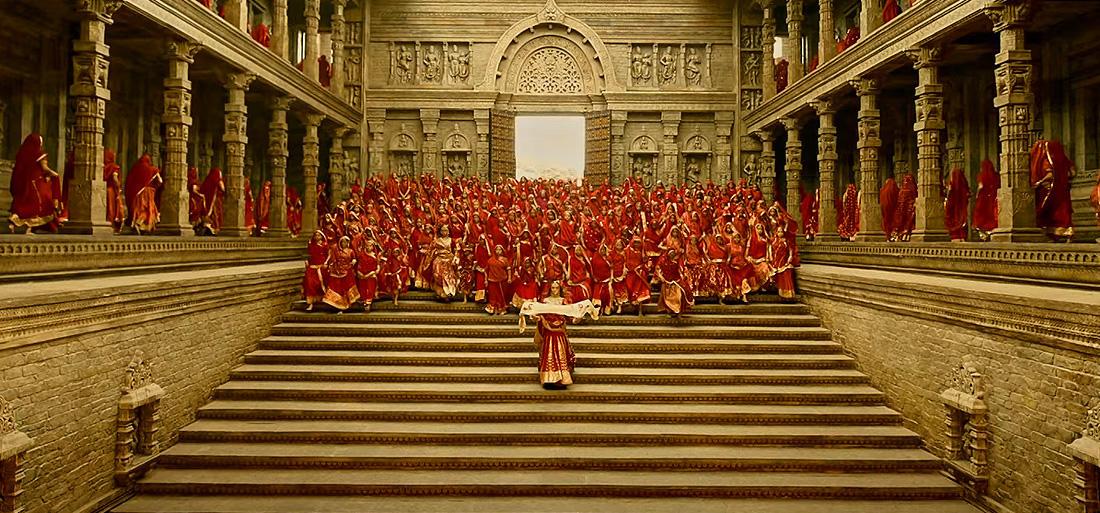Cinema Vérité
by Alexander Lee

Deepika Padukone in Padmaavat, directed by Sanjay Leela Bhansali. 2018. Feature film, 2 hr., 44 min.
“Have you seen Padmaavat?” asked my landlady. It was 11 a.m., late even for Delhi, but she had lain in wait on the terrace with a cup of tea. “Ridiculous, these goonda” — thugs, in Hindi — “carrying on. But I know nothing of the film. Is it actually any good?”
She was not alone in wondering. Controversy long ago trumped content in discussions of Padmaavat, the 14th-century period epic by director Sanjay Leela Bhansali that is now the seventh-highest grossing Hindi film of all time. The film relates the tale of a legendary Rajput queen and the raja who loves her: boy meets girl, boy’s Muslim rival lusts for girl, boy dies in battle and girl burns herself to death. Clearly, someone saw trouble coming, and Padmaavat may be worth the price of admission just for the legal disclaimers in its first five minutes, which deny that the filmmakers “intend to disrespect, impair or disparage the beliefs, feelings, sentiments of any person(s), community(ies) and their culture(s), custom(s), practice(s) and tradition(s).” The title cards also declare that Padmaavat “does not intend to encourage or support ‘Sati’ [female ritual immolation] or such other practices” and that “all the animals and birds in the this film have been treated with love, care & concern.”
No large-budget Indian film in years — and Padmaavat, at $33 million, was the third-most expensive film Bollywood has ever produced — has enjoyed such a bumpy path to the box office. Mobs disrupted the set several times, assaulting the director and destroying equipment. They injured several of the film’s well-loved horses with Molotov cocktails, and promised a cash reward to anyone who could find Deepika Padukone, the film’s leading lady, and chop off her nose. As the original release date came closer, protesters blocked roads and attacked school buses in Gurgaon while demonstrating for a nationwide ban. In the end, it was released only in 70% of India, and that was only after a Supreme Court verdict and a second trip to the board of film censors.
Western commentators have described the opponents of Padmaavat as “right-wing” or “Hindu,” lumping the controversy in with other challenges to freedom of expression — such as the income tax cases now cropping up against independent media outlets — that have enlivened the first Modi government. The reality, however, is more prosaic. The protesting group, the Shri Rajput Karni Sena, and its leader, Lokendra Singh Kalvi, are examples of the large class of hustlers who spend their lives trying to break into the big time of Indian regional politics. Kalvi’s political career has been defined by his failure to live up to the modest achievements of his father, who clocked a glorious four months as an energy minister in the early 1990s. The son’s career, by contrast, has led him through four different parties, all without any elected office to show for it.
The Sena’s agenda is similarly more parochial than the Modi government’s plan to remake the rhetorical basis of the Indian state. It advances the interests of a single upper caste group, the Rajputs, in a single state, Rajasthan. While most of their energy has been channeled into a dubiously constitutional attempt to win affirmative action benefits for Rajputs (the state’s traditional aristocracy), they have recently branched out into attacks on films thought to impugn Rajput honor, notably Jodhaa Akbar (2008), which also showed a Rajput-Muslim romance. The goal here, in case it’s not clear, is not a cinematic one; these “stirs,” as the Indian media call them, are meant to position the Sena as kingmaker in the run-up to the Rajasthan state elections due this fall. A Bollywood megastar’s nose, in other words, is sometimes just the cost of doing politics.

The fact that religion played a minor role in the agitation will not surprise anyone who actually saw the movie, since it would be difficult for a Hindu nationalist to find anything to dislike in Padmaavat, a film which 22nd-century film studies PhDs may find useful for understanding the insecurities of Modi’s India. Adapting an epic poem whose main thrust is the glorification of ritual suicide was always going to be a dicey proposition, but Bhansali, the director, turned it into an ethnically tinged morality play. The antagonist, Sultan Alauddin Khalji, is a comic-book villain who murders, betrays, and fornicates with gleeful abandon, and starts a war purely because someone once told him the other guy’s wife was hot. Alauddin is shown dancing wildly in darkness while scarfing down shanks of meat like a caveman, fortifying the colonial-era narrative that non-Hindus have an advantage in war and cricket (and a disadvantage in sexual constancy) due to eating red meat. His Hindu rivals, by contrast, gently peck on vegetarian morsels while bathed in natural light. Within the limits of Indian film censorship, Alauddin is also portrayed as bisexual, with a clean-shaven slave boy beside him winkingly described as his “begum,” or queen.

Modi’s Bharatiya Janata Party makes frequent rhetorical efforts to tie Islam to the oppression of women, so it is natural that Alauddin is shown as an abusive husband of a too-oppressed-to-talk wife, while the relationship of Padmavati and her husband, Ratan Singh, is portrayed as more egalitarian. This flies in the face of the crushingly traditional gender politics of the rest of the film, however. Polygamy is viewed as natural and completely consonant with true love (Padmavati and Ratan Singh meet cute while he’s on a trip to buy jewelry for his other wife). Padmavati herself is a whirlwind of culturally normative activity, charming her elderly relatives, dancing seductively (but only for her husband), and at last sacrificing herself to save her husband’s family from dishonor. The final scene, where hundreds of Rajput women burn themselves alive rather than face capture, is portrayed in slow motion as an act of feminist empowerment. They go to their fiery deaths with smiles on their faces — though the one young girl in the procession looks not so sure.

Why, then, did the Rajputs object to this thoroughly reactionary, arguably Hindu-supremacist film? While the riots have certainly improved their status as a local electoral player, the evidence suggests that the whole thing was simply a modestly ambitious shakedown. Reporters from India Today secretly recorded the leaders of one of the Karni Senas offering to “protect’’ the sets of controversial films for $230,000 a month, and even to send a few goons to protest for publicity purposes. This may explain why the Karni Sena refused to listen to clarifications about the plot in November, and then suddenly declared the end of the protest in February. The enormous success of Padmaavat may suggest that the BJP’s project to remake Indian history and culture is gaining steam, and yet even a large-budget Bollywood feature thoroughly in tune with the ideological climate cannot escape the swamp of corruption and clientelism that is retail politics in India. But as you look around a city plastered with taxpayer-funded billboards of Narendra Modi’s face, you start to think that may not be a bad thing. Maybe, some day, someone will try to deface his nose.